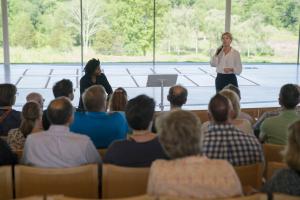Congregations Respond to Outbreaks of Violence
 Addy Sterrett, MM ‘18
Addy Sterrett, MM ‘18
When the communities of Santa Monica, California, and Boston, Massachusetts, were shaken by unexpected violence in 2013, congregations were among the first organizations to offer acts of healing in each city. Leaders from a prominent parish in each scene of tragedy made presentations on the first afternoon of the Congregations Project conference, challenging all participants to consider how they might respond in their own settings if violence were to erupt there.
The Catholic parish of Saint Monica has long been an important institution in the heart of Santa Monica. After a a shooting at Santa Monica College left six people dead, including the gunman, a close relationship with the city enabled the church both to offer the witness and solace of Catholic liturgy to members and to reach beyond its own tradition to address the suffering of the larger community. Funeral masses for the victims, all of whom were Catholic, showed the capacity of ritual to “transform a moment of tragedy into a moment of, if not hope, comfort,” as Director of Music and Liturgy Dale Sieverding put it. In addition, Monsignor Lloyd Torgerson, the pastor of St. Monica for over 30 years, visited and prayed with many of the people directly affected by the act of violence, including the shooter’s mother. His acts of boundary-crossing compassion allowed even those outside the Catholic community to feel a sense of comfort in the days following the tragedy.
As the six-month anniversary of the shooting drew near, St. Monica and the city’s two other Roman Catholic communities joined in a memorial Mass for the victims. Yet they also agreed that their prayers must reach beyond the walls of the Catholic church, both literally and figuratively. The result was an interfaith service held outdoors after the Mass. “We are the field hospital for healing,” said Christine Gerety, the associate director of the Outreach and Pastoral Care Department. Rather than turning inwards to heal only the members of their faith community, the religious leaders of St. Monica opened their doors to give all who came an offering of comfort and peace.
Like Saint Monica, Trinity Church has long been a visible and influential institution in its city. Further, the church’s central location and proximity to the tragedy put church leaders in a position to act in response to the Boston Marathon bombing. This location also presented challenges when access to the church was cut off by the crime scene investigation in Copley Square. As weekly church events neared, parish members began wondering how to proceed with worship in a time that so desperately required it. Assistant music director Colin Lynch knew the important role music could play in such a mournful time and was able to enter the church to retrieve music for the weekly choir rehearsal. Rushed for time, Lynch simply grabbed the music that was easiest to reach, which happened to include Shaker hymns, Faure’s Requiem, and music from recent funerals. The next evening, all the choirs of the church gathered for an impromptu service of song and prayer in the street, just outside the barriers surrounding Copley Square.
As Sunday morning approached and access to the church was still blocked off, it became clear that it would be impossible to worship in Trinity’s landmark building. Temple Israel—empty on Sunday mornings—invited their Episcopal neighbors to worship in their space. Worship leaders from across Boston generously supplied Trinity with everything they needed to ensure worship could go as smoothly as possible. According to Rev. Rita Powell, “being ministered to by other churches changed us”; typically Trinity is on the giving, not the receiving, end of such exchanges. The turn-out was remarkable. Over 900 people worshiped in Temple Israel on that Sunday morning. As it happened, this Sunday was what liturgical Christians call “Good Shepherd Sunday.” Following the already-appointed readings, the congregation chanted the psalm they might have chosen on purpose if it had not already been provided: Psalm 23, the familiar psalm of God’s presence even in the valley of the shadow of death.
One year later, the next Boston Marathon and the anniversary of the bombing fell on Easter weekend. Beside a new fire, leaders from all the Abrahamic faith traditions shared reflections, memories, and prayers. The importance of exchanging spiritual traditions became amplified in the face of violence, especially during a time marked by prejudice and unjustified hate of the Islamic community.
That new fire was also part of the liturgy of Easter Vigil, upon which the Episcopalians of Trinity Church would embark after the interfaith service. This parish’s own traditions—the songs sung at the barricades, an appointed psalm, a new fire, and more—had provided just what was needed. Rev. Patrick C. Ward remarked that “we often think of tradition as something that is behind us. Tradition is actually running ahead of us”.